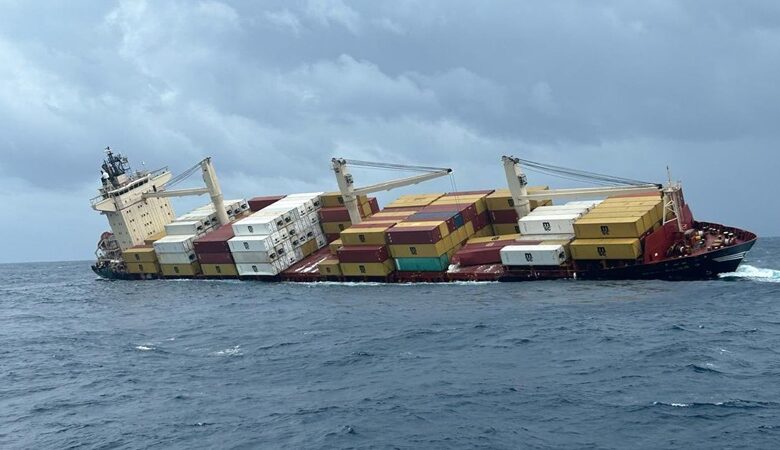Ship containing calcium carbide sinks off Kochi: How bad is it for marine world?
News Mania Desk / Piyal Chatterjee / 25th May 2025

A significant environmental danger arises off the Kerala coast following the sinking of the Liberian-flagged container vessel MSC ELSA 3 early Sunday, roughly 38 nautical miles from Kochi.
The ship, transporting 84.44 metric tons of diesel, 367.1 metric tons of furnace oil, and 640 containers—among them 13 containing hazardous materials and 12 filled with calcium carbide—overturned after significant flooding occurred in one of its holds. Although the entire crew of 24 was successfully retrieved in a joint operation by the Indian Coast Guard (ICG) and the Indian Navy, worries have escalated regarding the potential for a major oil and chemical spill.
The ICG has sent its pollution response vessel ‘Saksham’ and is utilizing aircraft with sophisticated oil spill mapping capabilities to oversee the region. Up to now, there have been no official reports of an oil spill, but the situation is under careful observation due to the significant risk from the ship’s fuel and dangerous cargo.
The Kerala State Disaster Management Authority (KSDMA) has alerted the public, urgently advising them not to touch or come near any containers or items that might arrive on the coast.
The authority emphasized the risk of marine gas oil and very low sulfur fuel oil (VLSFO) spilling into the ocean, which might have catastrophic impacts on the region’s ecologically delicate and tourist-abundant shoreline.
Calcium carbide, referred to as calcium acetylide, is a colorless crystalline substance with the chemical formula CaC. It is usually created by combining lime (calcium oxide) with coke (carbon) in an electric furnace at temperatures near 2000C.
The compound is primarily utilized to produce acetylene gas, an essential raw material in the chemical sector for creating different organic compounds. A significant feature of calcium carbide is its intense reaction with water. When it comes into contact, it reacts exothermically, generating acetylene gas and calcium hydroxide.
The heat produced in this reaction can be considerable, and the acetylene gas generated is highly combustible, creating safety risks if not adequately managed.
Moreover, the produced calcium hydroxide raises the water’s alkalinity, which could disturb aquatic ecosystems by changing the pH levels—crucial for the health, reproduction, and survival of aquatic life. Furthermore, the discharge of acetylene gas into water sources can affect water quality, especially in water bodies utilized for drinking or agricultural use.
Floating containers have been observed adrift from the wreck, with some anticipated to arrive on shore in the upcoming days. The Coast Guard and state officials are on high alert, working together to manage any spill and retrieve dangerous substances. Fishermen and local residents are encouraged to stay watchful and immediately report any sightings of containers or oil remnants.
The event highlights the susceptibility of Kerala’s marine ecosystem to maritime disasters, with specialists cautioning that a significant spill could ruin marine organisms, fisheries, and community livelihoods.
The ICG maintains leadership in monitoring and response initiatives as salvage operations advance amid difficult weather conditions.






